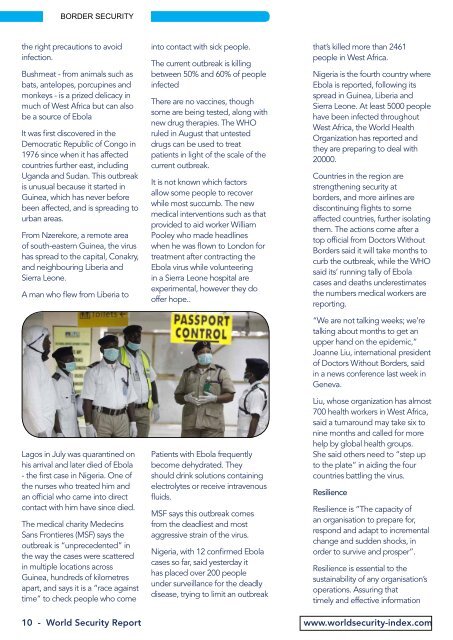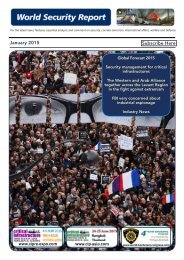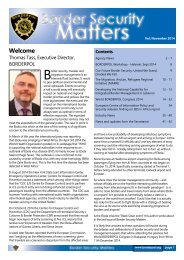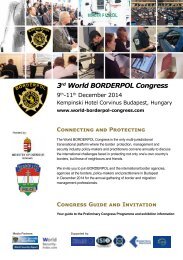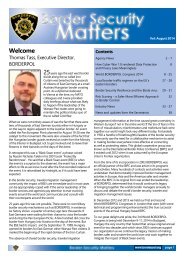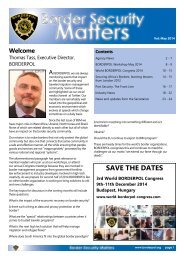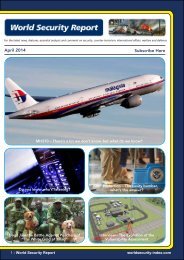September 2014 Subscribe Here
World Security Report September 2014
World Security Report September 2014
Create successful ePaper yourself
Turn your PDF publications into a flip-book with our unique Google optimized e-Paper software.
BORDER SECURITY<br />
the right precautions to avoid<br />
infection.<br />
Bushmeat - from animals such as<br />
bats, antelopes, porcupines and<br />
monkeys - is a prized delicacy in<br />
much of West Africa but can also<br />
be a source of Ebola<br />
It was first discovered in the<br />
Democratic Republic of Congo in<br />
1976 since when it has affected<br />
countries further east, including<br />
Uganda and Sudan. This outbreak<br />
is unusual because it started in<br />
Guinea, which has never before<br />
been affected, and is spreading to<br />
urban areas.<br />
From Nzerekore, a remote area<br />
of south-eastern Guinea, the virus<br />
has spread to the capital, Conakry,<br />
and neighbouring Liberia and<br />
Sierra Leone.<br />
A man who flew from Liberia to<br />
Lagos in July was quarantined on<br />
his arrival and later died of Ebola<br />
- the first case in Nigeria. One of<br />
the nurses who treated him and<br />
an official who came into direct<br />
contact with him have since died.<br />
The medical charity Medecins<br />
Sans Frontieres (MSF) says the<br />
outbreak is “unprecedented” in<br />
the way the cases were scattered<br />
in multiple locations across<br />
Guinea, hundreds of kilometres<br />
apart, and says it is a “race against<br />
time” to check people who come<br />
into contact with sick people.<br />
The current outbreak is killing<br />
between 50% and 60% of people<br />
infected<br />
There are no vaccines, though<br />
some are being tested, along with<br />
new drug therapies. The WHO<br />
ruled in August that untested<br />
drugs can be used to treat<br />
patients in light of the scale of the<br />
current outbreak.<br />
It is not known which factors<br />
allow some people to recover<br />
while most succumb. The new<br />
medical interventions such as that<br />
provided to aid worker William<br />
Pooley who made headlines<br />
when he was flown to London for<br />
treatment after contracting the<br />
Ebola virus while volunteering<br />
in a Sierra Leone hospital are<br />
experimental, however they do<br />
offer hope..<br />
Patients with Ebola frequently<br />
become dehydrated. They<br />
should drink solutions containing<br />
electrolytes or receive intravenous<br />
fluids.<br />
MSF says this outbreak comes<br />
from the deadliest and most<br />
aggressive strain of the virus.<br />
Nigeria, with 12 confirmed Ebola<br />
cases so far, said yesterday it<br />
has placed over 200 people<br />
under surveillance for the deadly<br />
disease, trying to limit an outbreak<br />
that’s killed more than 2461<br />
people in West Africa.<br />
Nigeria is the fourth country where<br />
Ebola is reported, following its<br />
spread in Guinea, Liberia and<br />
Sierra Leone. At least 5000 people<br />
have been infected throughout<br />
West Africa, the World Health<br />
Organization has reported and<br />
they are preparing to deal with<br />
20000.<br />
Countries in the region are<br />
strengthening security at<br />
borders, and more airlines are<br />
discontinuing flights to some<br />
affected countries, further isolating<br />
them. The actions come after a<br />
top official from Doctors Without<br />
Borders said it will take months to<br />
curb the outbreak, while the WHO<br />
said its’ running tally of Ebola<br />
cases and deaths underestimates<br />
the numbers medical workers are<br />
reporting.<br />
“We are not talking weeks; we’re<br />
talking about months to get an<br />
upper hand on the epidemic,”<br />
Joanne Liu, international president<br />
of Doctors Without Borders, said<br />
in a news conference last week in<br />
Geneva.<br />
Liu, whose organization has almost<br />
700 health workers in West Africa,<br />
said a turnaround may take six to<br />
nine months and called for more<br />
help by global health groups.<br />
She said others need to “step up<br />
to the plate” in aiding the four<br />
countries battling the virus.<br />
Resilience<br />
Resilience is “The capacity of<br />
an organisation to prepare for,<br />
respond and adapt to incremental<br />
change and sudden shocks, in<br />
order to survive and prosper”.<br />
Resilience is essential to the<br />
sustainability of any organisation’s<br />
operations. Assuring that<br />
timely and effective information<br />
10 - World Security Report www.worldsecurity-index.com


